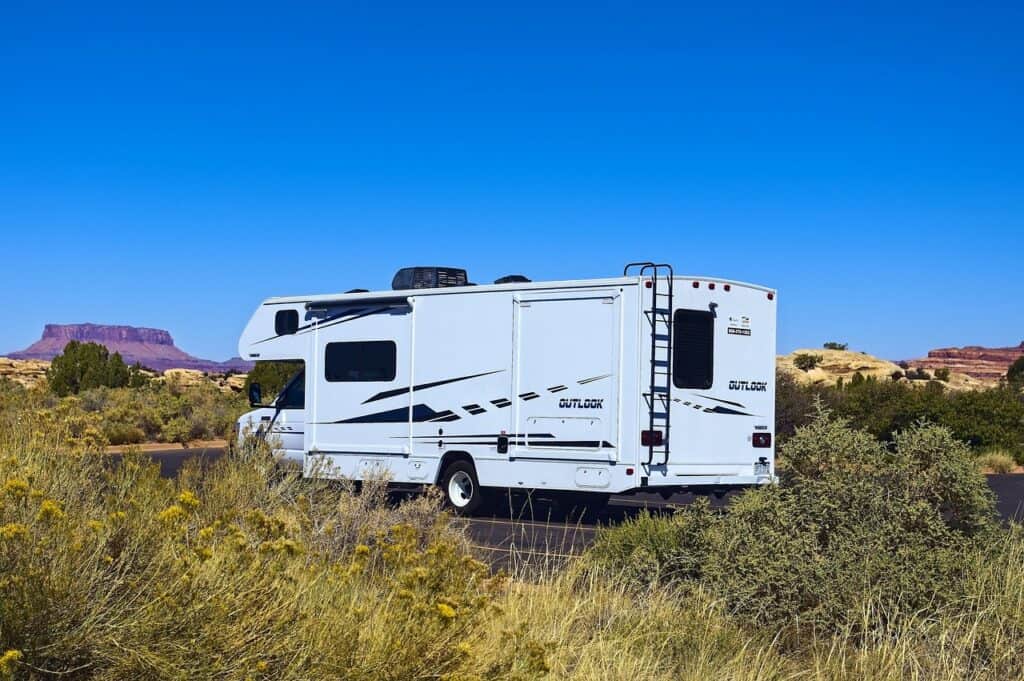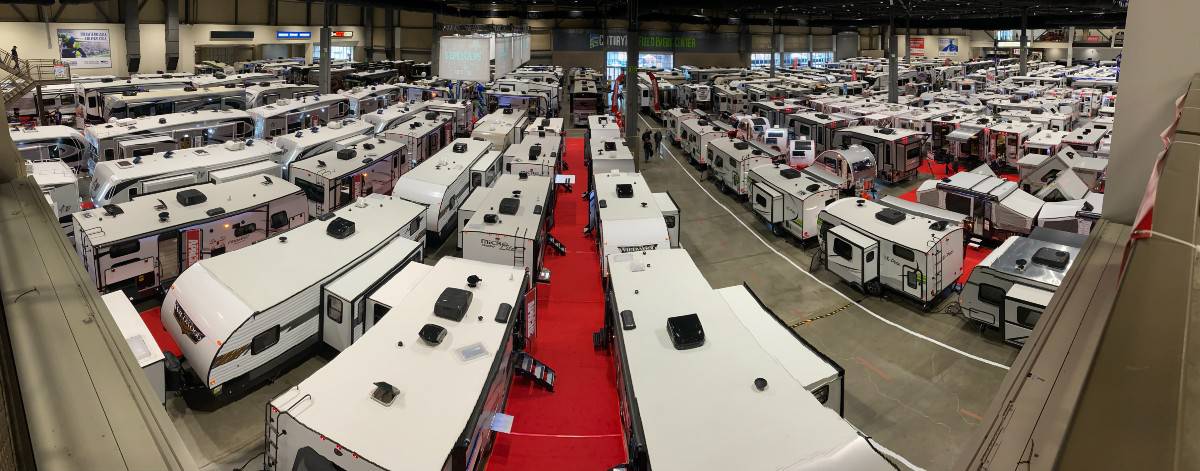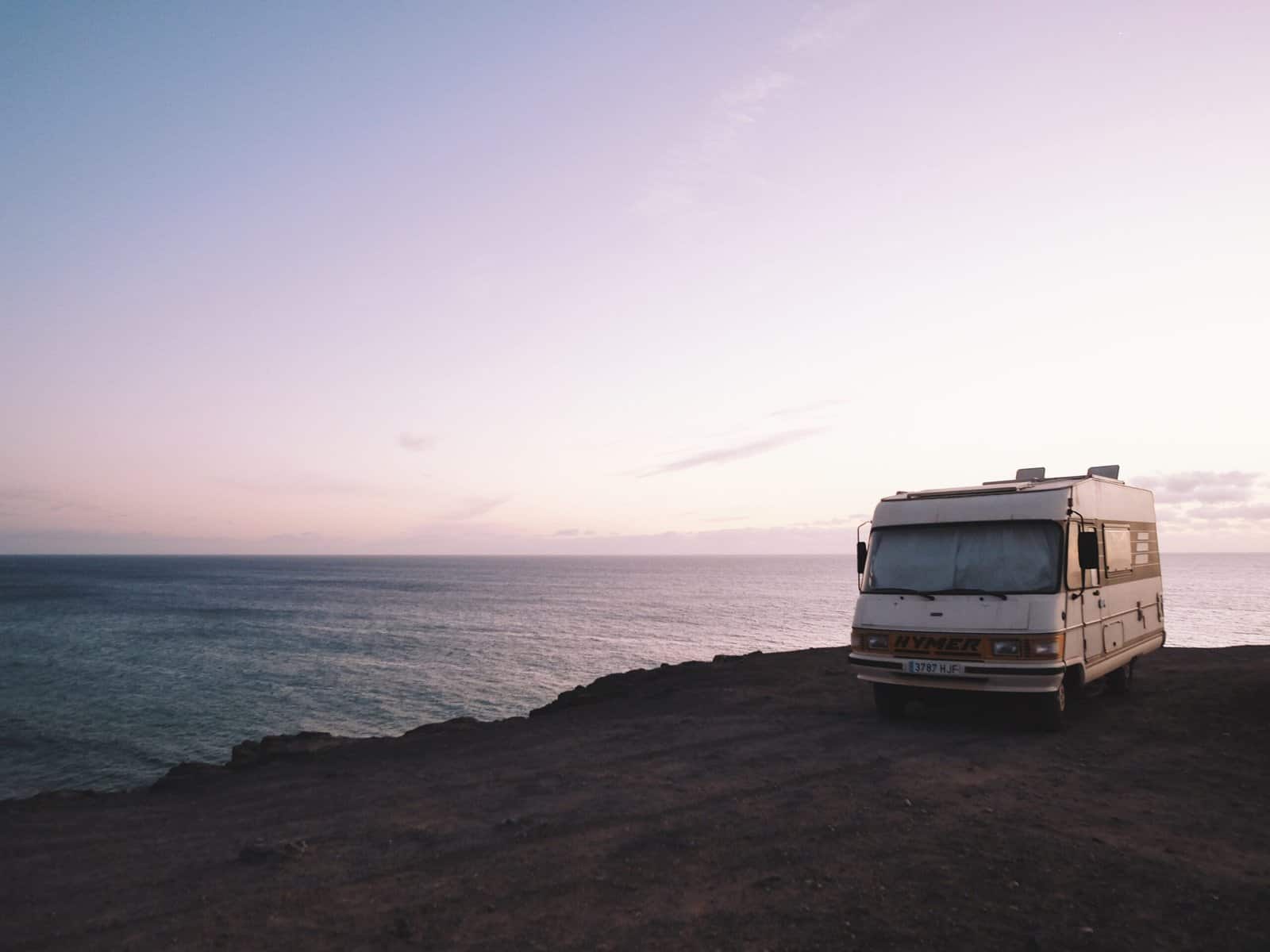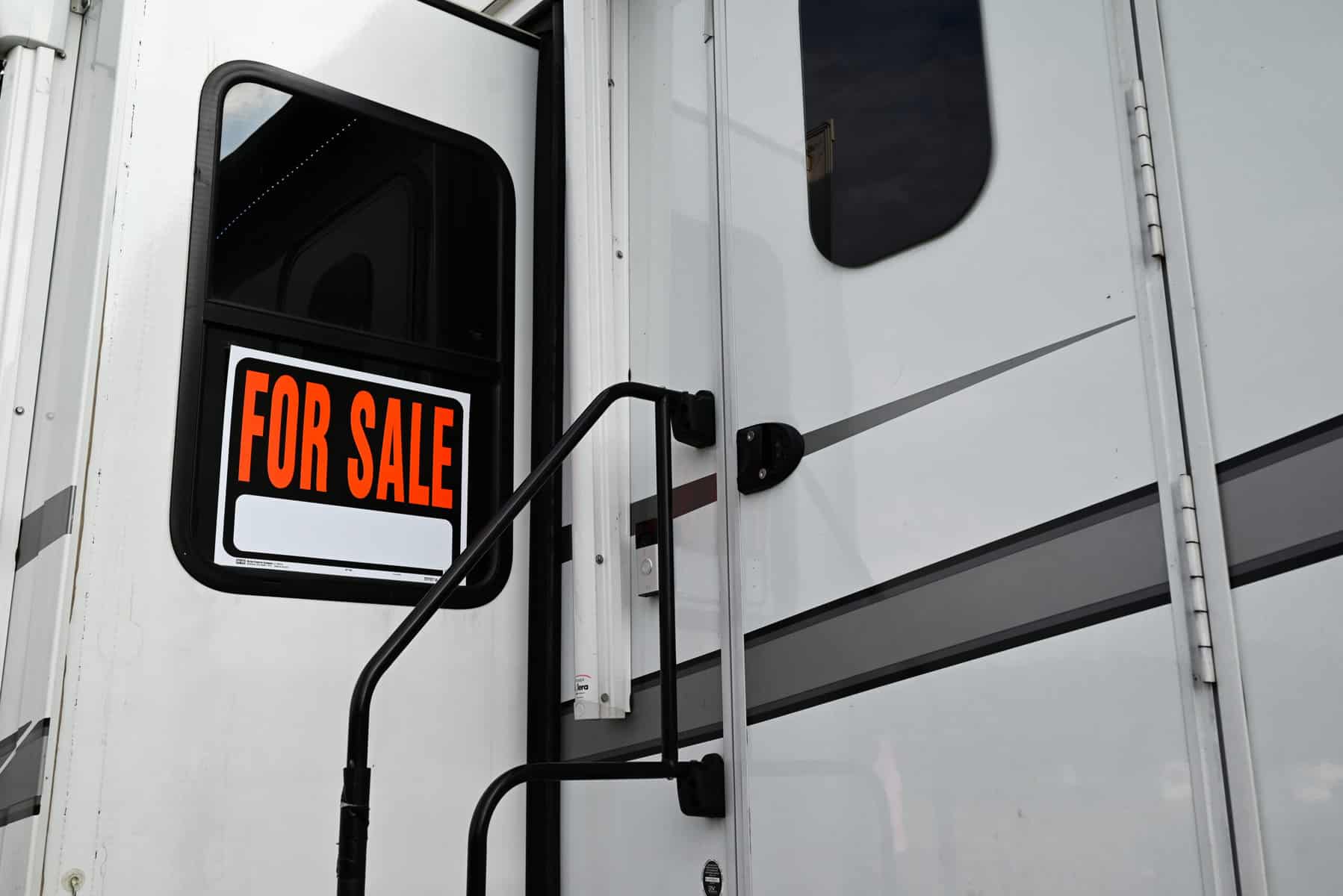The debate between the pros and cons of a fifth wheel vs. motorhome is often animated and passionate, but neither one is truly better than the other. What is right for you is a matter of your needs, your budget, and frankly, your personal preferences. It’s like saying, “Which is better, a cat or a dog?” Well, that all depends.
If you have not already made up your mind about whether you prefer fifth wheel trailers or motorhomes, I’ll try to help. Here are some of the benefits and downsides of these two types of RVs.
Fifth Wheel vs. Motorhomes: Comparing Features and Floorplans
Both fifth wheels and motorhomes offer a wide selection of sizes, floor plans, amenities, and prices. Generally speaking, you can get either one with toy hauler features, multiple bathrooms, bunkhouse sleeping, a washer and dryer, and many other creature comforts.
Both RV types can have similar utilities, like multiple air conditioners, a water heater, black and gray storage capacity, side-by-side refrigerators, entertainment centers, king beds, etc. Many have the same size of holding tank capacities, too.
One unique difference between the features found in these two types of RVs may be that you can purchase a fifth wheel trailer with a free-standing island in the kitchen with extra storage space. Additionally, some fifth wheels have an exterior drop-down side patio, much like the drop-down back deck of a toy hauler. I have never seen a motorhome with either of these two features.
Floorplans are another thing to consider.
Generally, fifth wheels boast higher ceilings, more creative floorplans with more slide-outs and floor space. Some even go as far as to include two or three bedrooms.
That said, many fifth wheel floorplans are set up in such a way that the rig cannot be used when the slides are in. This isn’t the case in a motorhome. Every motorhome I’ve ever stepped foot in is totally usable (if a bit cramped), even when all slides are pulled in.
Let’s Compare Cost Differences
A major difference between these two RV types could be the cost. For example, you could theoretically spend a million dollars or more on a high-end diesel pusher, whereas the most expensive Luxe 47’ fifth wheel toy hauler, fully appointed with all the upgrades, will still only cost roughly $250,000.
However, these are the top-tier prices for these types of RVs. It’s completely reasonable to expect to pay closer to $120,000–$180,000 for either one.
The Biggest Difference Between a Fifth Wheel and Motorhome? Towing.
As you probably already know, there is one other fundamental difference between these two different types of RVs: the engine (or lack thereof).
Fifth wheel trailers must be towed, while Class A motorhomes have an engine built into them so they can be driven. This is the biggest difference between the two types of RVs, and it changes everything.
Every fifth wheel needs a tow truck, but every motorhome doesn’t need to tow a vehicle.
Because 5th wheels lack an engine, there is the added expense of purchasing a towing vehicle for the fifth wheel. This is in addition to the cost of the trailer and can make buying a fifth wheel quite expensive.
Some people may already have a truck suitable for towing a trailer, so they won’t need to add that extra expense. Unfortunately in many cases, an existing truck’s towability is not adequate for the size of the fifth wheel a person wants. In such a scenario, upgrading the truck to a heavier model is wise. Alternatively the potential buyer could compromise and search for a smaller trailer model.
There are two towing metrics that must be factored into the selection of an appropriate fifth wheel towing vehicle.
- The first is the load capacity (weight limit) of the truck
- The second is the towing capacity (pulling strength) of the truck.
Hauling a very large and heavy towable RV requires a one-ton or greater heavy duty truck. Some of these very heavy duty trucks can cost almost as much as the fifth wheel trailer!
On top of all that, many fifth wheel and bumper-pull trailer owners find that hitching up every time they move the RV is a hassle. Do you plan to travel often and only stay put for short stints? If so, you might prefer the ease of travel that a motorhome provides.
When it comes to a motorhome, towing a dinghy or “toad” vehicle is not required. But if you want to dig into a destination and get to know it better, a small town car, motorcycle, or RV-friendly e-bike is advisable. And if you buy one, there is the cost of setting up your motorhome for towing a vehicle. It won’t be as costly as buying a tow truck for a fifth wheel, but it can cost a few thousand dollars for new motorhome towing equipment.
Related: What Camper Can my Vehicle Tow? A Safe Towing Guide
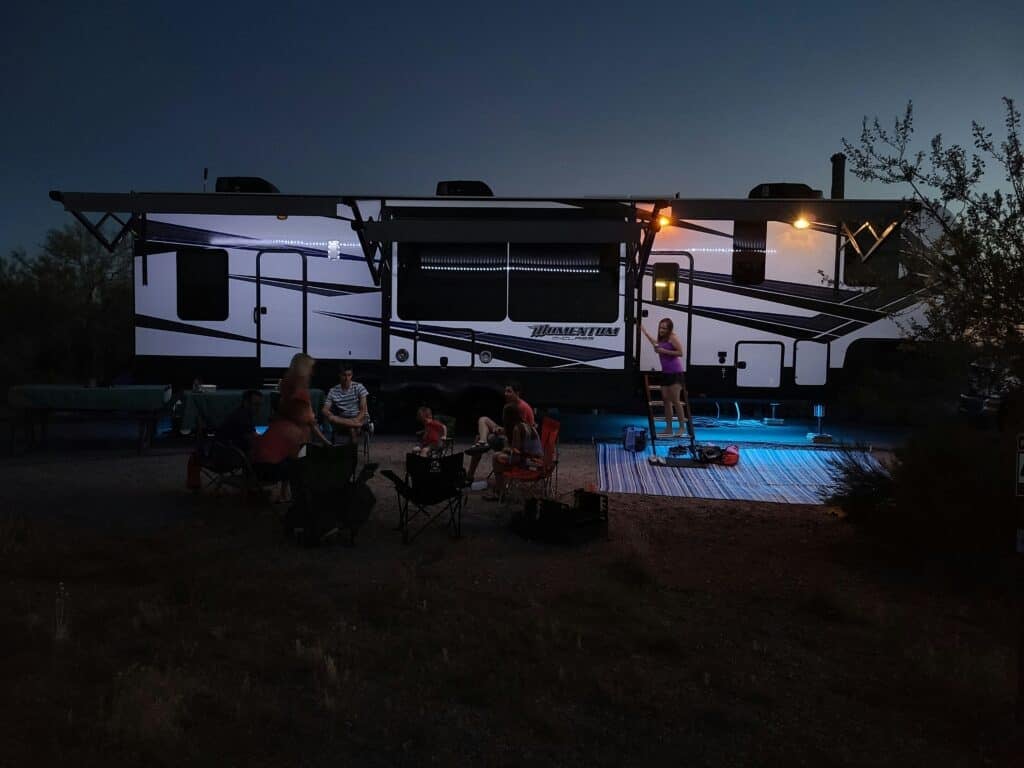
Maintenance Considerations
Overall, the cost for motorhome maintenance is more than the cost for fifth wheel maintenance. This is the case even when you take truck maintenance into account.
For starters, it can be difficult to find mechanics willing to work on motorhomes. Once you do, they are likely to charge more for work on such a large and heavy vehicle. If you have a diesel RV, things get much trickier and more expensive. And then you still have maintenance on the dinghy (i.e. your daily driver vehicle) to worry about.
Another thing to keep in mind? If your motorhome is in the shop for engine-related repairs, it cannot be used for camping or living purposes. This is obviously a major problem if you live in your RV full time. Of course, you could also end up with a fifth wheel that is stuck in the shop for other types of repairs. However this is less likely to be an issue. Many trailer problems can be fixed by savvy RV owners or mobile techs.
- No matter which type of RV wins the “fifth wheel vs. motorhome” battle for you, make sure to use RV Life Maintenance to keep up with maintenance tasks and avoid costly repairs!
Related: RV Maintenance Costs: How Much Should You Budget?
Hitching and Unhitching Considerations
When you camp in a fifth wheel trailer and you get your RV set up, the truck can be disconnected from the trailer and used for sightseeing and outings. This is one of the major benefits of the fifth wheel trailer.
With a motorhome, if you don’t tow a dinghy (or “toad” in some circles), you’ll need to disconnect your RV from the campsite before you can go sightseeing. Not having the use of a separate vehicle is a major drawback. That’s why the vast majority of motorhome owners do tow a dinghy. The added cost of the vehicle (like the added cost of the truck) must be calculated into the overall price of the rig.
Fifth Wheel vs Motorhome: Backing Up
Another feature of fifth wheel trailers is they can be backed up while connected to the truck. This is a blessing, but can cause issues if you don’t have enough practice. Challenges also happen when backing up on uneven surfaces, or into tight corners. This is because many truck and fifth wheel combinations exceed 60 feet in total length. Backing up something that large is tricky.
We watched a new fifth wheel owner turn a campsite into a destruction derby. He repeatedly over-steered and hit everything from the picnic table to the utility poles, and almost hit his neighbor’s RV, too!
A motorhome can also be backed up, but not if it’s towing a dinghy. The only exception to this rule is if the dinghy has all four wheels on a trailer. In this case, it’s akin to the process of backing up a bumper-pull travel trailer.
Not being able to back your RV can put the driver in some very difficult situations. Campgrounds, gas stations, parking lots, and even road hazards are big hassles when you can’t back up.
As an example, a motorhome driver may not be able to get the rig completely turned around in a tight location. This creates extreme tension on the tow bar connecting the motorhome and the tow car together. The greater the tension, the more difficult it is to remove the dinghy and stow the coupling device so the motorhome can be safely backed up.
Related: Backing Up a Fifth Wheel Like a Pro
Of course, backing up is not the only navigation hassle of fifth wheels and motorhomes. All RVs are much bigger than a car or van. RV drivers need to allow for all that extra size by trip planning with RV-safe routes. There are overpasses that are too low for either type of RV. Many steep narrow grades are not suitable for big rigs. And there are always maneuvering challenges in parking lots and campgrounds.
Knowing where your back tires are is an important part of moving forward, turning, or going in reverse. You’ll need to go slow so you can watch how your motorhome or trailer wheels are positioned in the roadway. Plus, when turning you’ll need to know where the rooftop is in relation to utility poles while navigating through a tight turning radius.
We’ve camped in a Thousand Trails RV Park in Palm Desert, California, which was built in a date palm orchard. There were huge date palm trees on virtually every corner of the interior roadways in this park. During our stay we saw numerous RVers hit these trees. Each one of those accidents could easily have been avoided. If the RV drivers had been going slower and understood the need to allow extra space for their RV to swing wide around the corners, damage could have been prevented.
So, Which is Better to Buy? A Fifth Wheel or a Motorhome?
There you have it: the essential facts you need to know about a fifth wheel vs. motorhome. So which one is better?
From my perspective, the terror of backing a fifth wheel trailer outweighed all other considerations. However, if you’re not intimidated by learning how to back up a trailer, then your main consideration might be the costs, floor plans, and amenities of the different RV models. There’s no doubt that you can purchase a great fifth wheel or motorhome. Both provide all that the RV lifestyle has to offer. First understand how various options fit into your personal camping plan. Then you can confidently say you just bought the best RV for you.

